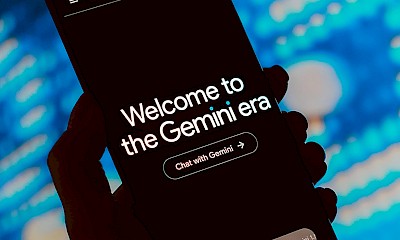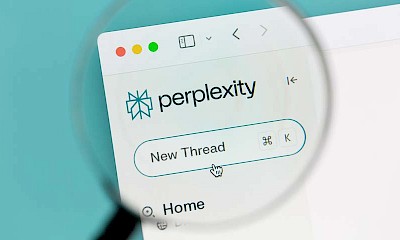Research on frequently asked questions and conversational keywords.

AI SEO: How do you finally become visible in ChatGPT, Gemini and Co.
The rapid development of artificial intelligence is presenting companies with new challenges: Visibility in search results is dwindling and traditional SEO strategies are losing their impact. But this is precisely where there is enormous potential. Those who focus on SEO for AI at an early stage can utilise the opportunities, secure reach and position themselves as pioneers in their own industry.
So far, only 18% of companies use AI SEO specifically (see Statista) - seize your chance!
17.8% fewer clicks with Google's new "AI overview"!

Are you afraid of the great invisibility in the age of AI?
According to studies, 67% of people over the age of 16 in Germany use AI - that equates to almost 56 million people. This is a huge market for you and your brand, which will have a decisive impact on your profitability. With AI SEO, you are laying the foundations for an intelligent future. Get to know us - non-binding, transparent, friendly.

All top topics on AI SEO at a glance
- AI traffic vs. classic search traffic
- What are the biggest opportunities with SEO AI?
- What are the biggest risks of SEO AI?
- Why shouldn't SEO texts be created with AIs?
- How do AIs such as ChatGPT, AI Mode & Co. affect user behavior?
- What impact does AI SEO have on ranking and website traffic?
- Differences between classic SEO and AI SEO
- Optimization factors for AI SEO
- Differences in AI SEO for ChatGPT, Gemini and Perplexity
- How to optimize for ChatGPT?
- How do you optimize for perplexity?
- Example: How you can optimize a blog post for AI SEO
- Which tools are helpful for AI SEO?
The most important facts about AI SEO in a nutshell:
- Google's new "AI Overview" leads to a significant decrease in clicks on websites - by 17.8% on average
- AI SEO means optimizing content so that it can also be found and understood by artificial intelligence (such as ChatGPT).
- Traditional SEO factors such as pure keyword optimization are becoming less important, while context, quality, structure and topicality of content are becoming more important
- The greatest opportunities of AI SEO lie in increased efficiency, personalization, user-centricity and visibility in AI-generated answers
- The biggest risks of improper use of AI for SEO are loss of quality, duplicate content and, even more drastically, falling click rates
- User behavior is changing: impressions are increasing, interaction with websites is decreasing, so old SEO KPIs should be questioned and redefined

What is AI SEO?
AI SEO refers to the adaptation of search engine optimization to the new challenges and opportunities created by artificial intelligence in search engines and digital assistants. While traditional SEO aims to improve websites for traditional search queries, AI SEO is about designing content in such a way that it is also recognized and preferred by Google AI Overviews, ChatGPT or Bing Chat. The importance of AI SEO is growing as more and more users submit their search queries via voice assistants or chatbots and search engines increasingly rely on AI-based answers.
The most important terms relating to SEO AI at a glance
AI traffic vs. classic search traffic The conclusion from the comprehensive "AI vs Search Traffic Analysis" by chatgpt-vs-google.com
AI assistants maintain strong growth rate
Claude (5.6%), ChatGPT (5.3%) and Perplexity (5.1%) continue to grow faster than traditional search, indicating continued user adoption of AI-powered alternatives.
Content-dominant industries dominate referral traffic
The automotive and vehicles, food and beverage, and health industries lead traffic generation and provide excellent opportunities for content optimization and investment in SEO.
The search landscape is diversifying beyond Google
With a 41.91% share for Google, the search ecosystem is fragmenting into AI assistants, privacy-focused alternatives and specialized platforms, necessitating multi-channel optimization strategies.
Users from AI are 5x more likely to convert than users from traditional SEO
What are the biggest opportunities with SEO AI?
AI tools automate time-consuming SEO activities such as keyword research, content optimization and technical analyses, which significantly speeds up work processes and minimizes sources of error.
People find out about artificial intelligence in advance, so they already know much better what they want and need when they land on your website.
AI can assist in creating and improving content that is relevant and engaging for both search engines and users, provided it receives good prompts on relevance, readability and user intent.
Artificial intelligence facilitates collaboration between editorial, IT, UX, PR and product management so that SEO can be operated as part of an integrated marketing approach.
AI enables the creation of personalized content that better meets the individual needs and intentions of the target group and thus strengthens user loyalty.
It is increasingly about optimizing content for new search environments such as voice search, chatbots or social search and thus also reaching younger target groups.
What are the biggest risks of SEO AI? The use of AI in SEO offers numerous opportunities, but is associated with difficulties and risks
- Inaccuracy and misinformation: AI-generated content can contain incorrect, incomplete or duplicate information, which can jeopardize the credibility and ranking of the website.
- Duplicate content: Artificial intelligence often draws on existing data sources, resulting in content that is very similar or appears copied - a risk for search engine rankings.
- Keyword stuffing: AI can lead to the overuse of keywords, which can be recognized as spam and penalized by search engines.
- Generic, impersonal content: If the prompts to the copywriting assistants are inadequate, the risk of "thin quality" increases. Automated copywriting therefore offers no added value, is generic and does not stand out from the competition.
- Lack of human nuance: AI often does not understand linguistic subtleties such as humor, irony or target group needs, which leads to less authentic and emotionally appealing content.
- Loss of quality and penalties: Google increasingly recognizes low-quality content and can devalue websites with "thin content" if there is no human review.
- Technical and ethical challenges: Integrating AI into SEO strategies is complex, can be expensive and raises questions about privacy and responsibility for AI-generated content.
- Excessive automation: Too strong a focus on automation can lead to the benefits for the target group taking a back seat, which search engines evaluate negatively.
If you work with unchecked AI texts in SEO, you run the risk of being penalized. In many cases, this can even lead to duplicate content, as the quoted content from the AIs already exists in one form or another elsewhere. AIs work and learn with existing data, so they will never be able to produce new content.
AI-generated texts without added value can be recognized by tools, search engines and even by the AIs themselves. Since anyone can now create content with little time investment, this is no longer a relevant metric for search engines. Search engines and AIs are increasingly concerned with genuine content quality, trustworthiness of content and unique content. Websites that rely exclusively on AI-generated content lose keyword focus, relevance and authority (trust in search engines and for users). These values are difficult to restore later!
Suitable tools for checking texts are e.g.
Google's AI Overviews are changing SEO for good.

Secure the decisive competitive edge with AI SEO!
Imagine your website disappearing from search results because competitors are quicker to adopt AI SEO. Intelligent search systems are changing the rules of the game: If you don't optimize specifically now, you risk no longer being found by customers. Only 18% of companies are already making targeted use of AI SEO (Statista 2024) - the majority remain invisible and lose reach, while others achieve up to 50% more visibility. Don't let your company disappear into the digital shadows.

What is Google AI Mode and what will it look like?
Google AI Mode is a new search function from Google that has been available in the USA since May 2025. It uses Gemini and appears as a separate tab alongside the classic Google search. In AI Mode, search queries are automatically broken down into many sub-questions ("query fan-out") to provide comprehensive, quoted and personalized answers. Users can search by text, voice or image, ask follow-up questions and receive suggestions based on their search behavior. In the future, AI Mode will also automate purchases and integrate personal Google services such as Gmail.
How will Google AI Mode change the traditional search engine?
To summarize: Search will become exclusively conversational. The SERPs as we know them today will be replaced by an interactive chat interface with user-specific answers and suggestions. The actual search and user-centered summary and evaluation of the findings will be handled by the AI, and users will do less and less of the interaction with various pages and websites themselves.
Is AI Mode the future of all search engines?
How do AIs such as ChatGPT, AI Mode &
Artificial intelligence such as ChatGPT, AI Mode and similar systems are changing user behavior in a variety of ways and are having a lasting impact on both private and professional processes.
Users are increasingly turning to smart chatbots to get quick, precise answers instead of using traditional search engines or reading long articles.
AI assistants are increasingly being used for everyday tasks such as composing emails, scheduling appointments, learning aids and solving technical problems.
Users benefit from customized answers and individual applications that are tailored to their needs - for example through their own GPTs or plugins.
Users are becoming more demanding and expect precise, customized, reliable and up-to-date answers. E-E-A-T (Experience, Expertise, Authoritiveness, Trustworthiness) is moving more into focus.
The average session duration for AI chatbots is 8-14 minutes, which shows that users interact more intensively and for longer with these systems than with traditional websites.
The advice and interaction takes place much more in the chatbots and less on the website. Users from the AIs come to the website better informed and are more willing to convert.
Traffic on mobile devices is almost on a par with desktop traffic. However, the search intention can vary, as desktop usage tends to indicate use during work, while mobile tends to indicate private use.
AI systems support numerous languages and reach users worldwide, including in emerging countries, which promotes use across language and cultural boundaries.
Expert tip: When linking from ChatGPT, Gemini and Perplexity, users land on the homepage much more often than on the cited landing page. Good user guidance and internal linking from the start page is therefore important so that users can still reach their destination easily and satisfy their search intention.

Are you already noticing declining numbers? Stay visible with AI SEO!
Are you already noticing declining click, impression and sales figures? This effect can increase significantly in the future if you miss out on the new visibility requirements. We can help you find solutions for short, medium and long-term strategies in the digital age 2.0.
What is AI most frequently used for and what does this mean for search intent?
The greatest potential for AI SEO therefore lies in the "personal and professional support" of users. It is therefore more important than ever to understand the search intention precisely and to serve it as specifically and holistically as possible. Even beyond keywords and links. In AI search engine optimization, the focus is on people as individuals. Whoever best serves the search intent is visible.
Source: https://hbr.org/2025/04/how-people-are-really-using-gen-ai-in-2025
What impact does AI SEO have on ranking and website traffic?
You can find out more about the study here: https://wordsmattr.io/exklusive-google-ki-studie/
Differences between classic SEO and AI SEO
Optimization factors for AI SEO
Various factors are crucial for a successful AI SEO strategy. The most important points are listed below:

What role do linking and link building play in times of AI SEO?
Link building is also indispensable with AI SEO, but is being further developed through new requirements for quality, context and strategic integration. Backlinks remain an important ranking factor, as they serve as a trust signal for search engines such as Google and underline the relevance and authority of a website.
Even if ChatGPT, Gemini or Perplexity can analyze and evaluate content better and better, Google continues to use the backlink profile to assess the quality and credibility of a page. Link power is particularly crucial for competitive keywords: pages with many high-quality, thematically relevant backlinks from trustworthy sources have been proven to rank better and maintain their positions more stably. However, one insight that can already be drawn is that the structural structure of linking - both internal and external - is increasingly about relevant context, added value and professional authority. The quantity of backlinks no longer means anything in the age of AI SEO.
Differences in AI SEO for ChatGPT, Gemini and Perplexity
The optimization for ChatGPT, Gemini and Perplexity differs in several aspects - from the sources used and the relevant ranking factors to the content focus and technical possibilities.
- ChatGPT is based on a large language model (LLM) that understands content semantically and relies on pattern recognition of data volumes. Relevance is created primarily through recognizability in the model, semantic consistency and presence on third-party sites. ChatGPT does not store original documents, but abstracts content into numerical vectors. Visibility depends on how strongly a brand or topic is anchored in public discourse.
- Gemini (Google) is multimodal and can process text, images, audio and video. The AI uses a broad database, including Google's own sources such as Search, Maps and YouTube. Visibility benefits from a strong presence on Google platforms. Gemini places particular emphasis on reasoning capabilities and multimodality, which means that content with images, graphics or videos can score extra points.
- Perplexity relies on an algorithm that pays particular attention to authoritative listings, awards and online reviews. Perplexity favors up-to-date information, accesses web content in real time and is particularly good at extracting precise answers. For local queries, reviews and directories are crucial.
What are the characteristics that identify AI content?
The role of images, graphics and video for visibility in AIs
Gemini is the AI system with the strongest multimodality: images, graphics and videos are directly included in the response generation and can significantly increase the visibility of content, especially if they are provided with structured data and metadata. Multimedia content plays a subordinate role in ChatGPT and Perplexity, as these systems work primarily on a text basis. ChatGPT can process images via plugins, Perplexity occasionally accesses PDFs, but the focus is on text-based information.
To summarize: If you want to score points with multimedia content, you should rely on Gemini and mark up the content accordingly with metadata and schema mark-up. For ChatGPT and Perplexity, the focus remains on providing text-based, clear and up-to-date information.

How to optimize for Google AI Overviews?
Google AI Overviews generate answers from multiple sources and present them as compact summaries. To appear in these overviews, the following measures should be taken:
- Provide up-to-date and accurate information
- Use structured data
- Highlight expert knowledge
- Formulate clear, concise answers
How to optimize for ChatGPT?
- Align content with conversational keywords and user questions, consider questions and colloquial formulations in addition to classic keywords
- Provide answers directly: The most important information should be at the beginning of the text.
- Use multiple answer formats (lists, tables and FAQs)
- Ensure topicality and relevance on an ongoing basis

ChatGPT SEO from one of the best SEO agencies in Germany
ChatGPT SEO has been revolutionizing search engine optimization since 2025 at the latest. Do you still want to be visible in the future? We'll show you how. Our search engine optimization has received numerous awards and certifications - we look forward to getting to know you soon in a non-binding initial consultation.
How do you optimize for perplexity?
- Create high-quality, fact-based content
- Use structured data (schema markup) such as FAQ, article or product markup
- Provide concise answers to frequently asked questions
- Strengthen authority and trust (E-E-A-T), e.g. with high-quality backlinks or backing from reputable sources
Example: How you can optimize a blog post for AI SEO
Use headings, lists and tables. Which multimodal content is suitable? Images, graphics, videos (YouTube)? This is your chance to show your comprehensive expertise!
Which semantic topic groups and sub-topics are included around the topic so that all questions are answered for the user?
Do the individual sections, the "chunks", make sense and are they coherent? Do they offer added value? Are there content elements for user interaction (buttons, sliders, sliders, jump labels,...)?
Choose an author with proven expertise and experience. Can studies be cited to support the authority of the information?
Mark up question-and-answer games with schema markup for FAQs, how-tos or product information, for example.
Is the most important content easy to find from the homepage? Most users start from there.
Users trust you: Review and adapt content to ensure it is up to date.
Which tools are helpful for AI SEO?
Note: The measures and tools mentioned support the analysis, for example by comparing domain strength, backlinks and traffic metrics, but are only useful if the findings are interpreted semantically.
Conclusion: The future of SEO in an AI world
In the future, SEO will no longer be about working according to the long-established patterns of traditional search engine optimization, but rather focusing on people as individuals. The importance of expertise, topicality and structuring will continue to increase. Those who rely on AI SEO at an early stage will secure a long-term competitive advantage and increase their visibility in an increasingly automated digital world.

Would you like to discuss AI SEO for your website in person?
Then get in touch with us. We look forward to getting to know you in a personal initial meeting and working with you to identify specific potential and measures for your brand.


















